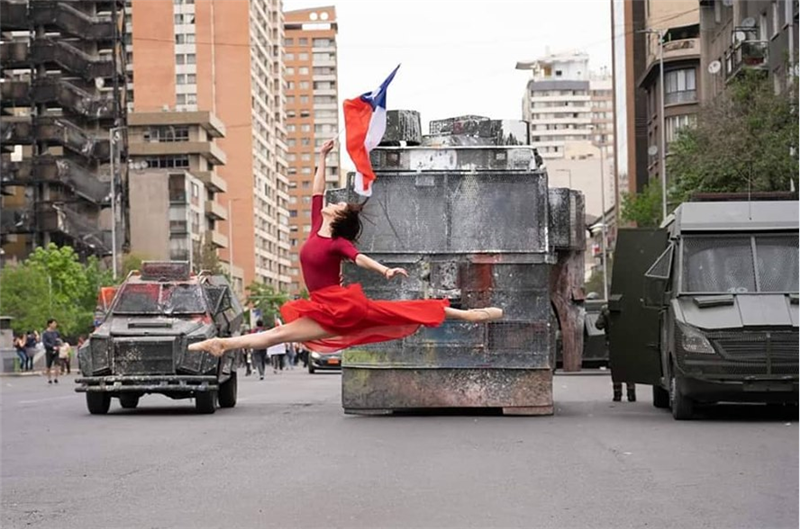
By Natascha Scott-Stokes —
Sunday 27th October 2019 — 2:45am: I go to bed with the sounds of a thousand voices screaming for a better Chile; I wake up with the roar of the crowd reverberating around my skull. Day and night, for a week now, I keep hearing the sound of the crowd and the slogans being called up and down the country:
Renuncia Piñera (Resign Piñera!) is one of the most common.
Pacos culiaos (Fucking police!) is another one.
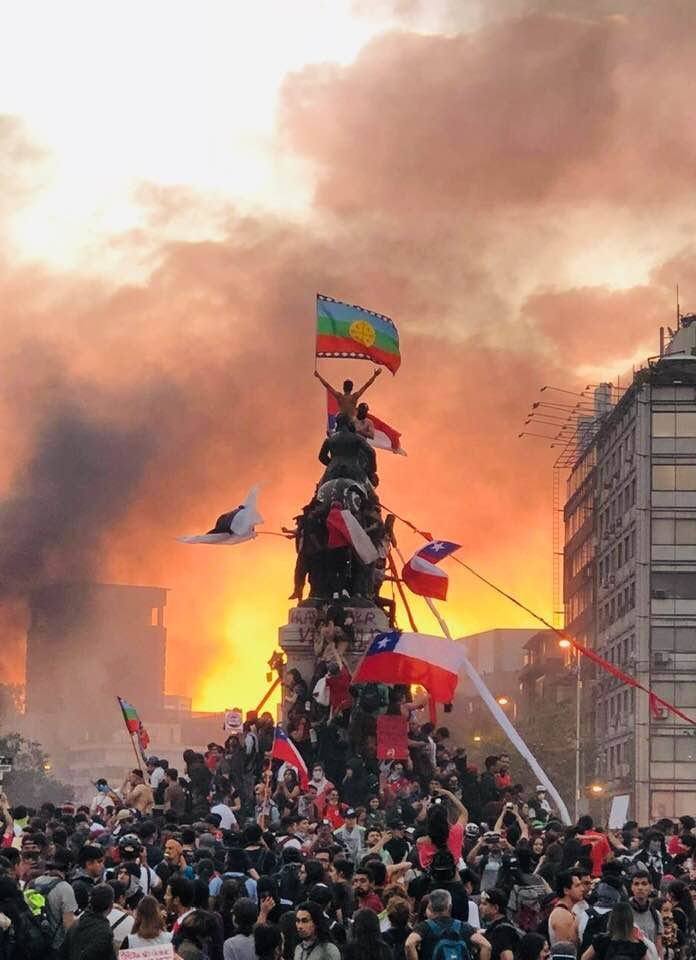
And then there are the many individually scrawled signs crowding my mind’s eye:
Thank you for having the courage to do what we have been too scared to do, these 30 years —since Chile’s military dictatorship ended, but not many of its undemocratic measures.
I am demonstrating for my auntie, who cannot pay her medical bills — referring to the massively inflated price of many drugs.
I am here for my child, who has no future without a decent education — only those with money can afford a half-way good education in Chile, and even the private schools are often below the standard of a mediocre European school.
I am more scared of my ex than you! — referring to the extreme brutality of the police, who have not hesitated to beat, arrest and humiliate ordinary citizens at peaceful demonstrations — not to mention a culture where men still feel free to abuse women.
It’s not a drought, it’s robbery — referring to the fact that Chile is the only country in the world with privatized water, and to a decade-long drought that means the big land-owners are diverting rivers and groundwater to their avocado plantations, even while entire villages are without drinking water in the central region, where most of the population lives.
I step outside to catch what is going on in my little country town, only to find the eerie silence of the curfew we have lived with for almost a week, since the President of Chile handed power to the military, who immediately imposed strict rules on our movements and right to assemble in public. A state of emergency and a curfew was declared in Santiago on Friday 18th October. By Monday, it included all of central Chile, where I live.
As a foreign resident, I do not have the legal right to attend protests against the state, even while I have the right to vote and must pay taxes, like every other Chilean citizen. If I or my sons are arrested and deemed to be acting against the interests of the state, we can be deported and lose everything we have – the life we have made, our home, our friends.
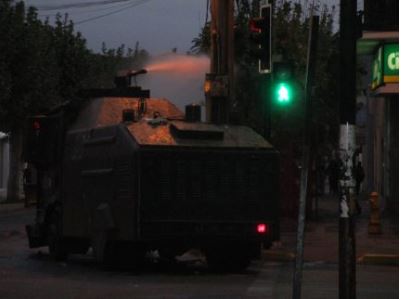
The shock of the absurdly violent response to legitimate protest has been one of the most disturbing experiences of this past week: water cannons went after handfuls of stone-throwing youth in my country town of no more than 50,000 people. Armoured tanks and iron-grilled police vans stood guard at our picturesque train station. Gas canisters were shot at men, women and children I see every day, going about our business on the high street. Young men and women my sons know as friends have been beaten up with truncheons and are covered in black and yellow bruises. Receiving those released from custody has become a new morning routine for this week.
But there are those that have not been released, and whose whereabouts and condition are not known. Disturbing lists of women are circulating, including their names and ID numbers, and the date and time they were last seen. I learned a new word this week. Desnudizacion: to force someone to get naked, which is a common humiliation tactic at detention centers.
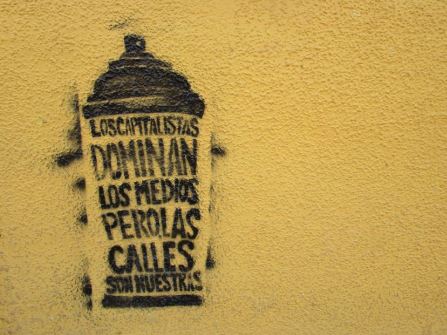 The shadow of the 1973 military coup in Chile casts a heavy pall over the confrontation between ordinary people and the state today. The genuine fear in the bones of every Chilean over 50 is palpable. They lived this as children, saw their loved ones taken away, never to be seen again; were conscripted against their wishes; saw bodies floating in rivers and were tortured and humiliated. No wonder people here don’t like to speak their mind, much less complain in public. Most Chileans would rather choke than tell you what they are thinking to your face. In this context, what is happening in Chile now is almost unbelievable.
The shadow of the 1973 military coup in Chile casts a heavy pall over the confrontation between ordinary people and the state today. The genuine fear in the bones of every Chilean over 50 is palpable. They lived this as children, saw their loved ones taken away, never to be seen again; were conscripted against their wishes; saw bodies floating in rivers and were tortured and humiliated. No wonder people here don’t like to speak their mind, much less complain in public. Most Chileans would rather choke than tell you what they are thinking to your face. In this context, what is happening in Chile now is almost unbelievable.
A moment of joy this week was the spontaneous concert of banging pots echoing throughout my neighbourhood on the first evening of the curfew. A series of known rhythms matched each other across the barrio, and there was a sense of solidarity in the air that was extremely heartening. Meanwhile, our streets were an eerie ghost-town, where fugitives ran from tree to tree and police cars cruised silently to catch them out.
The bravery needed to step up for what is right in Chile is of a whole different order, compared to others living in a so-called democratic country. The criminalization of even peaceful protest is a trend throughout the world, but in Chile it has a long history, and no one walking the streets here can ever forget that. But the youth leading this massive wave of civil unrest were not even born in 1973. What happened then are just stories to them, even if they are the stories of their aunts and uncles, mothers and fathers, grand-parents and old neighbours. But unlike them, they don’t care.
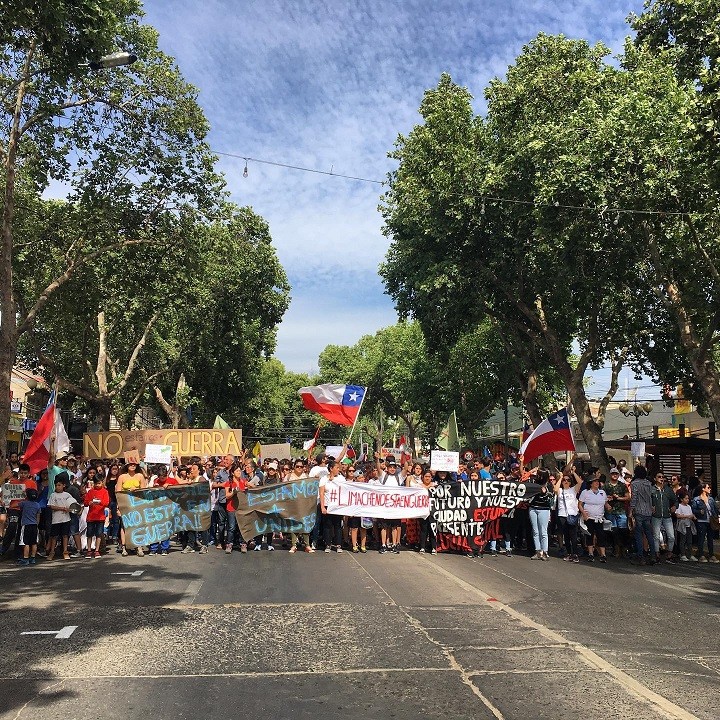
The reason this uprising cannot be stopped with even grotesque violence on the part of the state is that young Chileans know they have no future, the way things are. They have nothing to lose except their lives, and the profound nihilism born of their situation and this Latin culture we live in means a bullet in the head is not the worst that could happen. That would be living in fear and knowing you are permanently excluded from the wealth of this land. Even on a good day, a Chilean will tell you there is no point worrying about your safety: if it is your day to die, you will. If it isn’t, you won’t.
An increase in the price of metro tickets was the spark that lit this powder keg, where those on a minimum wage have to spend between 15% and 20% of their monthly income just to get to work, and even those on an average wage in the capital city see up to 12% of their income swallowed up by public transport. But this conflict is about so much more; most especially the fact that the cost of a week’s shopping at the supermarket is about the same as in Europe or North America. Yet “half of all working Chileans earn less than US$575 per month, while 70% of working Chileans earn less than US$750 per month.” (For helpful historical background analysis see the www.scottaraynhout.com blog by an American living in Santiago).
I oscillate between the elation of the new community spirit and the courage of the crowd that increases with every day, and the fear and paranoia of becoming a target. Much worse, of losing my precious sons in this storm that has already cost a class-room full of lives. Over 12,000 Chilean troops have been deployed against their own people.
Today, on Sunday 27th October, the state of emergency has been lifted, and last night there was no curfew, for the first time in a week. How strange it already feels to be allowed to walk out in the evening. But this battle is not over. It is just a lull. There is too much at stake for everyone involved, which can be guessed at by President Piñera’s astonishing public turnaround, in which he asked forgiveness from the Chilean people and offered immediate increases to their pathetic wages and pensions. But words are cheap and so was his offer. People want action and genuine change, and they want it now. Viva Chile!
©2019. Natascha Scott-Stokes is a British author who has been based in Chile since 2006.






Please remember that even those who fought the tragic Pinochet legacy in both Chile and the United States were not exempt from #reprisal by Vice Admiral Ann Rondeau and her National Defense University and the U.S. Southern Command. #DINA #torture #murder #Whistleblowers #WitnessIntimidation #WitnessIntimidationIsACrime
Interesting commentary in both the response and the original article. Although I am not on the ground in Chile now, I spent many years there during the history cited in the article. The fact is that this is one sided opinion matching to a tee the arguments coming from left leaning academics (Concepcion) who wanted to see a repeat of the Cuban model in Chile. I have been to many demonstrations on both sides, these were not uncommon events as it is in the Chilean nature to pour into the streets. In the past the police kept the two sides demonstrating/rioting separated and equally sprayed them with water cannon that often times had tear gas elements mixed with the water. The demonstrations ended and everyone went home. My comment is, Chile has democratic elections, where everyone is REQUIRED to vote and the military is not allowed to vote. So who exactly elected Pineda? And if that was a mistake, then the people should correct it in the next election. Any actions that threaten the survival of the government (any Government) will be met with strong resistance unless the democratic process as laid out in the constitution is followed. My thoughts currently from an arms distance.